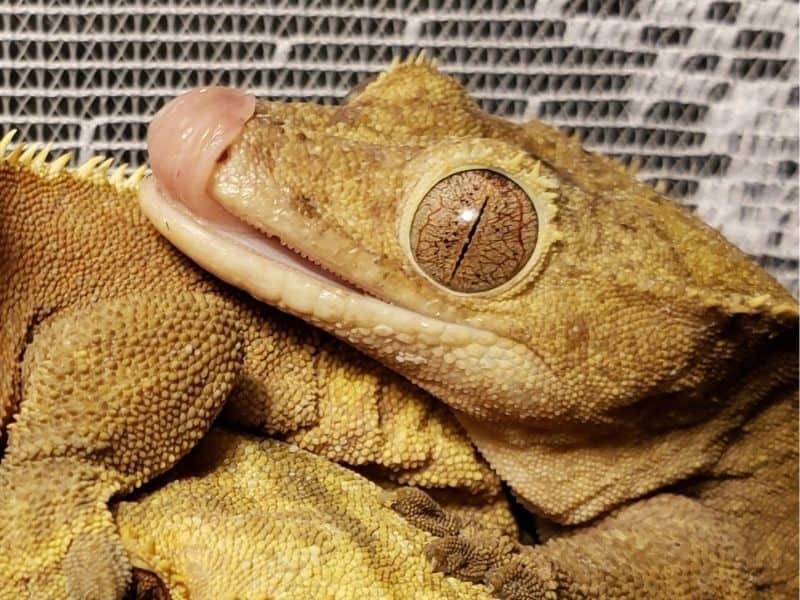Do crested geckos have teeth? You might be wondering if you’ve ever had one climb up your arm or try to take a swing at you. Crested geckos do indeed have teeth, and they use them for biting. However, not all of their bites are aggressive in nature- some are caused by the animal being startled or feeling threatened.
Crested geckos have teeth and can indeed bite. However, they are mostly docile and friendly animals which only bite in defense. A crested gecko bite doesn’t hurt much and should only be treated when the skin is broken. If bitten deeply, clean the area with a disinfectant then cover the wound.
Do crested geckos have teeth?

Crested geckos have 177 small teeth that are arranged in two rows. Although this is a large number of teeth, crested gecko teeth are very tiny and do little harm in the case of bite. You can easily tell this given their small size and number of teeth. To fit that many teeth in that small a mouth, the teeth have to be very small.
While gecko bites aren’t that common, they do happen. Crested geckos may only need to bite in aggression or fear of being handled. They may also get defensive if they are stepped on while trying to climb up something and will bite in order to protect themselves from possible pain that could occur when their toes are crushed.
Do crested geckos bite?
While crested geckos are gentle pets, they do have teeth and will bite to defend themselves. So yes, crested geckos do bite, but only if they feel threatened in some way. This is an uncommon event. It’s more likely that these small reptiles would try to run away from danger rather than fight back against it.
Some of the reasons why your crested gecko may bite include the following:
It’s stressed
When the crested gecko is stressed, it may lash out and bite. The crested gecko will do this when it feels like its life is threatened, or if there’s a perceived threat in the area such as another pet (or human) who approaches the enclosure.
You can know the gecko is stressed if it’s laid up against the back of its enclosure, or if it is darting around erratically.
If you do notice that your crested gecko feels stressed and bites when touched, take action as soon as possible to reduce stress levels by giving it a break from handling for an hour or two before returning again. This will help prevent any future biting incidents that might happen due to stress.
The ground surface should also be considered. Smooth surfaces can contribute to increased stress in crested geckos because they don’t have anything like vegetation on which to climb out their frustrations (which are invariably heightened during periods of high humidity).
READ MORE: Best Substrate for Crested Geckos
The gecko is scared
A crested gecko would also bite if it is scared. You may scare your crested gecko if you make sudden movements such as putting your hand into the cage quickly.
You can avoid that by being careful with how you handle the gecko. If you notice any signs of stress in general, leave the gecko alone for a while.
It’s in a new environment
When you introduce the crested gecko into a new environment, it might be scared. It’s natural to want to hold and comfort the crested gecko with its previous caretaker during this time of adjustment but you should always keep a distance between them for safety reasons. The crested gecko may bite if you try to feed or touch it because they think that person is going to harm them in some way.
If the crested gecko does bite someone out of fear, quickly reunite him with his previous owner so he can feel safe again. Consider placing one hand on each side of the enclosure and slowly working your hands towards him while speaking softly until he gets used to new people coming into his space.
Generally, a new or scared pet will try to defend its own space and you should thus always observe how it behaves before handling it.
How do you know a crested gecko is about to bite?
While most bites from a crested will be sudden, you can catch others before they happen with close observation of the gecko’s behavior. Some signs that your pet lizard is ready to bite include the following:
The gecko will twitch its tail
When the gecko’s tail starts to twitch, it may be a sign that the gecko is about to bite. This type of twitching can happen with or without aggressive body language from your pet lizard.
If you notice this behavior in your crested gecko, back away and give him/her some space so he/she doesn’t feel threatened.
It becomes observant
Although crested geckos are naturally curious animals, if it becomes overly observant when agitated, they may bite if you get too close. If you put your hand in their cage and they keep moving about in the cage following the hand, especially with other signs such as the twitching of the tail, they might just bite you.
Gaping mouth
The gecko may also bite if agitated, and they may do this more often if the gecko is not feeling well. An open mouth is one of the signs of aggression in lizards and, if ignored, the lizard may resort to biting anything threatening in its environment.
It may bark or hiss
Another sign of aggression in crested geckos is the tendency to bark. This is often used in territorial defense because the sound can travel quite far and echo off of objects; it may scare away potential predators before they get too close.
A crested gecko will also hiss when presented with a predator in order to ward them off as well (but this most likely only applies to larger animals). You might see their tails curling up around themselves and swaying back and forth while making these noises at an intruder.
These signs of aggression generally point to the gecko not being comfortable in its environment. You can just leave it alone or remove the condition making them aggressive and defensive to avoid a bite from them.
READ ALSO: Can Crested Geckos Live Together? Factors and Numbers to Keep
Does a gecko bite hurt?
The tiny teeth of a crested gecko don’t do much harm when the gecko bites you. The pain is a little bit weird but nothing major to worry about. You can equate it to the nibble of a fish where you feel some slight pinching and wetness but nothing much.
The crested gecko’s teeth and the size of the lizard itself mean that it doesn’t have enough power to puncture the skin or cause any further damage. As such, you shouldn’t be worried about a gecko biting you.
In the case that the crested gecko actually bites you and you see some bleeding, quickly disinfect the wound and keep it covered for a few days.
How to prevent leopard gecko bites
Although the chances of a crested gecko biting you are very low, you’re better off safe than sorry. You can prevent their bites with the following tips:
- Allow them to make the first move. They are proud creatures and do not like to be rushed or picked up by humans.
- Be gentle when handling them. Gently take hold of both gecko’s front arms, one in each hand from underneath the animal with your fingers curled around their forearms (firmly but gently). This will keep it calm because they can’t see you coming at them and feel trapped if held close to the body with a hands-on top.
- Hold a crested gecko only for as long as necessary while being careful about how much pressure is exerted on its delicate skin. An example would be picking it up from under the armpits and then placing back down quickly.
- Avoid sudden movements near its head area; this could scare or startle the lizard and it could quickly get aggressive.
- Always reach out into their cage from the side rather than the top since they’d easily mistake your hand for prey and want to bite back in defense.
- Avoid touching the gecko when it’s hiding or sleeping. It’ll feel cornered and may bite you to leave it alone.
- Also, don’t touch the gecko when it’s sleeping since you’ll startle it and it may respond with a bite. Just wait till it gets up from its sleep. Given that they sleep during the day, you’ll need patience with these pet lizards.
- Since crested geckos are sensitive to scents, always wash your hands, dry them then handle them. Otherwise, any strange smells can throw them off leading to a bite in defense.
If a crested gecko bites, it’s important to get professional help as soon as possible. Bites from pet lizards are not usually life-threatening but sometimes require medical attention nonetheless. The most common treatments for wounds caused by a crestie include hydrogen peroxide, Neosporin (antibiotic ointment) and/or topical antibiotic cream like bacitracin.
READ NEXT: Do Crested Geckos Play Dead? Sleeping and Death in Crested Geckos
